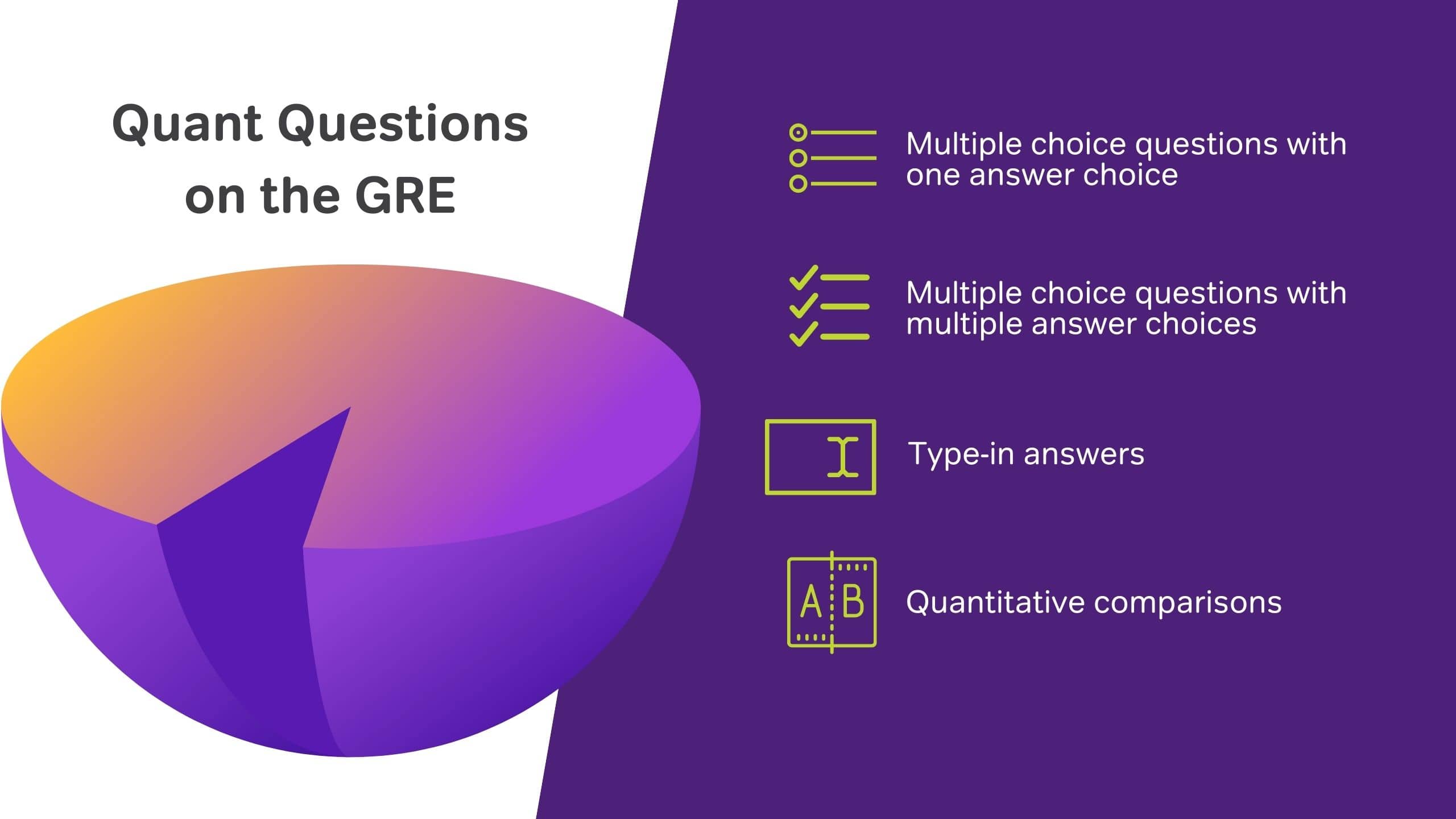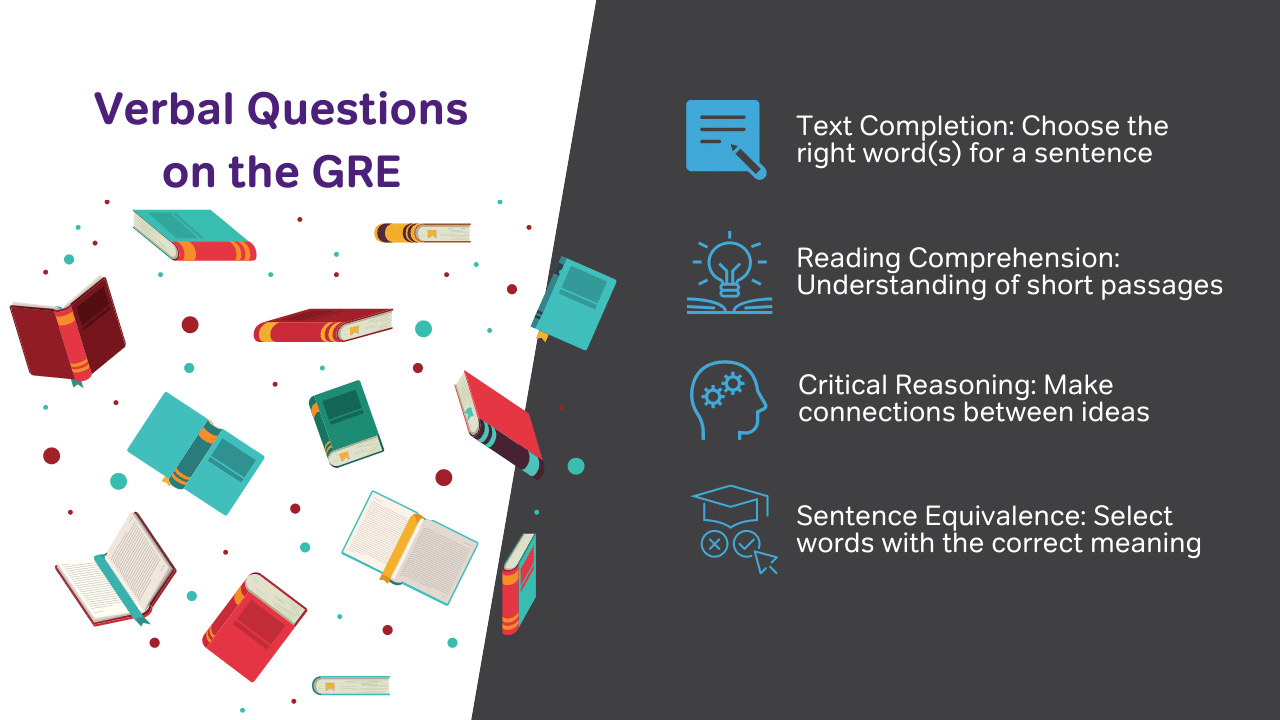
Enter Your Email to Start Your Free GRE Practice Test:
Magoosh is excited to offer you a free GRE practice test that emulates the real deal! Experience all 3 sections—Quantitative Reasoning, Verbal Reasoning, Analytical Writing—in an interface similar to what you’ll see on test day.
At the end of your online GRE practice exam, you’ll receive an estimated score for each section—including an AI analysis of your essay—as well as your overall GRE scaled score.
You’ll also be given a breakdown of your strengths and weaknesses by question type. Plus, every question comes with video and text explanations for you to review.
Practice Test Options
On the practice test start page, you’ll be able to select from these choices:
| Format | Sections | Questions | Time |
|---|---|---|---|
| Full-Length Exam | 5 | 1 Essay 12 Quant 12 Verbal 15 Quant 15 Verbal |
~2 hours |
| Shorter Diagnostic Assessment | 2 | 12 Quant 12 Verbal |
~40 minutes |
| Single-Section Test | 1 | 12 Quant or 12 Verbal | ~20 minutes |
For the best experience and most accurate GRE practice score estimate, we do recommend that you take the full mock test if you can. But if you’re short on time, feel free to take the shorter diagnostic or practice just a single section of the exam.
What to Expect on the GRE Practice Test
Test Structure and Features
The GRE became shorter in 2023, so our GRE sample test matches that new format:
- Writing – Issue Task: 1 essay in 30 minutes
- Math – 1st Section: 12 questions in 21 minutes
- Verbal – 1st Section: 12 questions in 18 minutes
- Math – 2nd Section: 15 questions in 26 minutes
- Verbal – 2nd Section: 15 questions in 23 minutes
The essay section always comes first, but note that the other sections are randomized.
❗If you’re brand new to the GRE, we recommend taking a look at our guide What is the GRE? as an introduction. There, we cover in detail what the GRE is, why you should take it for graduate school, and much more.
Additionally, you may want to try some sample GRE questions before diving into the full-length test.
Section Adaptive
Just like the real GRE, our practice test is section adaptive. That is, your performance on the first Quant or Verbal section impacts the questions you’ll see on the second section. The better you do on the first section, the more challenging questions you’ll face on the next.
Test Interface
As with the official exam, our example GRE test allows you to navigate back and forth between questions with ease. At any time, you can jump to any question within a section. Additionally, you can flag any question to remind yourself to take another look at it later on.

The Math Sections
First of all, if you’ve never done a GRE math problem before, we highly recommend trying some out before you take a practice test. For sample practice questions, along with a more in-depth look at the GRE math section and all of its question types, check out our GRE Math Review.
Question Types
The GRE Quantitative Reasoning sections consist of several different question types:
- Multiple choice questions with one selectable answer — The tried-and-true format you’ve seen on tests your whole life.
- Multiple choice questions with multiple selectable answers — From a set of checkboxes, you’re asked to select “all that apply.” So, there may (or may not!) be more than one correct answer.
- Numeric Entry — These are text boxes where you’ll need to type in your own answer.
- Quantitative Comparison — This question type is unique to the GRE and asks you to identify the relationship between two quantities.
Math Subjects
As far as subjects, the GRE primarily tests Arithmetic, Algebra, and Geometry. If that has you nervous, you’re not alone! A lot of test-takers won’t have studied these since high school or college. But that’s OK! You may remember more than you realize, and you can always brush up on these topics. Regardless, taking a GRE practice exam will help you to see what you already know and what you need to study more of.

The Verbal Sections
We’ll repeat our recommendation here: if you haven’t tried a GRE Verbal question before, now’s a great time to sample some before taking the practice test. You can find example practice problems as well as full details about the GRE Verbal section in our GRE Verbal Review.
Question Types
The GRE Verbal Reasoning sections test your vocabulary, reading comprehension, and critical reasoning skills through several different question types:
- Reading Comprehension — These questions come with passages, which vary considerably in length. They ask about your understanding of the text.
- Critical Reasoning — Technically a subset of Reading Comprehension questions, CR questions ask you to make logical connections between pieces of information in a short passage.
- Text Completion — Words will be missing from a sentence or paragraph, and you need to fill in the blanks based on the surrounding context. You’ll not only encounter single blanks, but also texts with two and three blanks. For questions with more than one blank, you must fill in the right answer for every blank in order for the answer to count as correct.
- Sentence Equivalence — SE questions ask you to select a pair of answers that complete a given sentence and that produce the same meaning. If your vocabulary is strong (and you can make it stronger with good preparation), these questions go quickly!
About the GRE Essay
The GRE essay is also known as the Issue Task. Given a brief prompt, you need to pick a side, present your argument, and support it. Think of a 5-paragraph essay with a clear thesis and conclusion, along with plenty of supporting details in the body paragraphs.
For a closer look at the GRE essay as well as a sample prompt, please see GRE Essay: Tips to Approach the GRE Analytical Writing Section.
![]()
Is the Actual GRE Harder than the GRE Practice Test?
The answer to this is complicated: it can be, but it depends!
Exam Content
In terms of content, the actual exam will be similar. You’ll see the same kinds of question types, in a similar distribution. You’ll also see a mix of question difficulties within a section. The difficulties will also adapt from one section to the next as well.
With that said, your particular GRE exam on test day will vary. That may be the day that the GRE has 3 challenging geometry questions, which makes it seem harder. Or perhaps all your Text Completion questions will only test vocabulary that you’re completely familiar with. And in that case, it’s going to feel easier for you.
Overall, keep in mind that different people will find different questions easy, medium, or hard depending on their training or background. A particular exam might seem like a breeze for you while being objectively difficult—or vice-versa.
Exam Experience
Lastly, for most people, the actual test is harder psychologically. Test-day pressure can make you more anxious than when you take a practice test at home. However, with enough practice in test-like conditions, you can prepare yourself to succeed in this environment, too.
What’s the best thing you can do to prepare for variations in question difficulty on test day? Practice as much as you can with a variety of questions of all different difficulty levels. That way, nothing you see on the official exam will throw you off your game!
For more thoughts on the difficulty of the GRE in general, see How Hard is the GRE?
![]()
Next Steps after Taking the Free GRE Practice Test
Congratulations on finishing the GRE practice test! But don’t stop there. Here are some important next steps to take:
1) Put your practice test score into context
First of all, remember that your GRE practice test score is just one data point. If you didn’t do as well as you had hoped, know that your score is just an indicator of where you’re at currently. Likewise, if you scored well, that’s great! But either way, there is still opportunity to learn and improve to ensure you can get the score you need on test day.
So, what score do you need? We cover this topic in GRE Score Range: What’s a Good GRE Score? Check that out to see where you currently stand both in general and in terms of percentiles.
2) Pick a study schedule
Now that you have an idea of your strengths and weaknesses as well as how close you are to your target score, you can start thinking about how to study for the GRE. One of the best ways is to follow a study schedule. There are several different options depending on how long you have to study and which areas you want to focus on.
Also take a look at How Long Should I Study for the GRE?
3) Study the explanations to your GRE practice test
Don’t let your GRE prep stop after just seeing your practice test score! For any question that you missed on the sample GRE exam, be sure to look over the explanations. That’s one of the most important steps you can take during your studies. In fact, we strongly encourage you to keep an error log. The more you can learn from your mistakes, the more you can avoid them in the future.
4) See how an expert takes the practice test
In the following video, watch how our GRE expert took this mock test. See what they focused on, how they approached each question, and what they highlighted to watch out for.
Official GRE Practice Tests & GRE Sample Papers
Also, don’t let this be the last GRE practice test that you take! It’s a good idea to take multiple practice tests over the course of your studies to prepare you for the real exam.
In fact, ETS—the makers of the GRE—offers two free GRE practice tests called POWERPREP Online. You’ll receive a score at the end of either of these exams, but there are no explanations provided. Since these are official practice exams—and thus the closest you can get to the real thing—we recommend saving them for later in your studies to serve as the best gauge of what score you can expect to receive on your upcoming test day.
GRE Practice Test PDF
ETS does still host a couple of GRE practice test PDFs on their site. However, these GRE sample papers were made before the GRE became shorter in 2023. While these are still a good source of practice questions, these practice exams do not match the updated and shortened format of the GRE in present day. Additionally, since these are paper tests, they are not able to adapt from section to section like the real GRE. Therefore, we don’t recommend using these GRE sample papers as mock tests—it’s best to stick with the online, computer-based exams for that.
More Opportunities for Practice
If you’re looking for more questions after finishing the full practice test or want to work through some beforehand, be sure to check out these resources:
![]()
Closing Thoughts
Practice tests are a key part of how to best study for the GRE. We hope this free GRE practice test is the springboard that propels you on your way to greater heights.
For even more questions and practice tests, as well as lessons covering all the content you need to know for the GRE, take a look at a Magoosh GRE Premium plan. Happy studying!
FAQs About the Online GRE Practice Test
Can I Take the Practice Test with Extra Time?
Yes, to take the Magoosh GRE Practice Test with extra time, update your profile before answering any test questions (see here for screenshots):
- Your sample practice test will begin on a “section start” screen
- In a new tab, go to your Edit Profile page
- Select the amount of extra time and click the Update Profile button to save
- Refresh your other tab and then start the first section
Please see GRE and Disability Accommodations for more information on requesting accommodations on the actual exam.
Can I Use a Calculator on the Practice Test?
Yes, just like the real GRE, we have a basic calculator built into the interface. On test day, you can’t use a physical calculator or an app on your phone, so it’s best to start practicing with the on-screen calculator now.
Is It Okay to Guess on GRE Questions?
Yes! There’s no penalty for guessing on the GRE, so be sure to answer every question.






